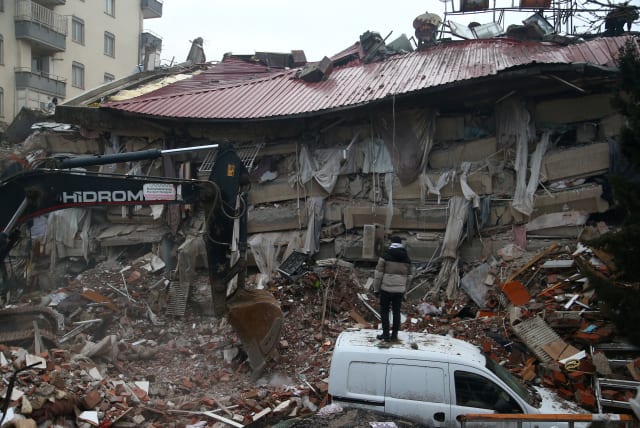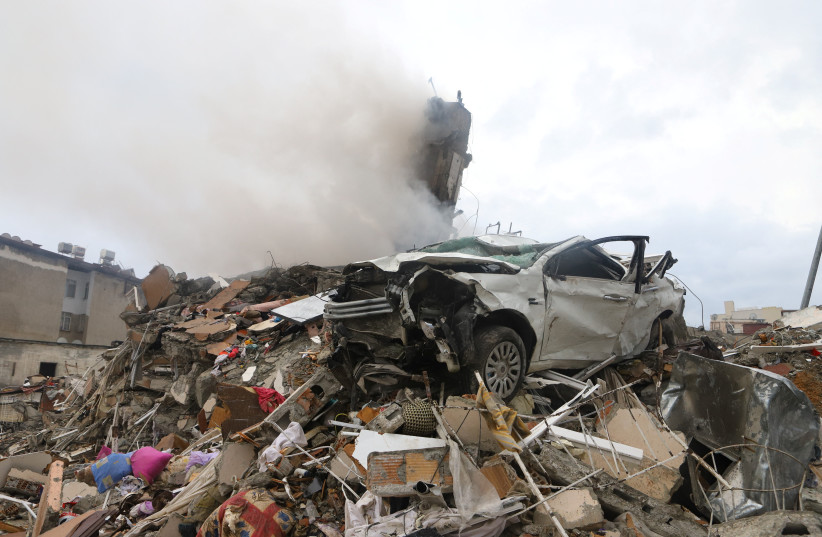Israel won't be ready for a large earthquake for over a decade - source

There is a government plan to improve the structural integrity of buildings to protect from earthquakes, but it isn't really being carried out, a top official said.
It could take Israel more than a decade to be ready for a large earthquake, even if it started to prepare immediately, a senior source has told The Jerusalem Post.
“It will take a long time to carry out the plan” for improving the structural integrity of buildings across the country, “but it would take longer to rebuild after an earthquake. I don’t know how it would be handled. It could take more than 10 years,” said the senior official.
On one hand, the IDF Home Front Command, the National Emergency Authority (RAHEL), including its special earthquakes steering committee, the police and fire departments, the Construction, Health, Transportation and Education ministries and a variety of other authorities have made significant progress in search and rescue and electronic warning capabilities when it comes to earthquakes.
On the other hand, the official said, despite repeated warnings from the state comptroller at Knesset hearings and from think tanks, nearly none of the approximate 80,000 buildings in the country that is highly vulnerable to earthquakes has received the improvements needed to help withstand a major quake.
The general rule is that only buildings put up after 1980 were constructed with the ability to withstand earthquakes. The source said: “There is a [government] plan. But regarding improving the structural integrity of buildings in the periphery or older buildings, it is not really being carried out.”
Why is the plan to reinforce Israel's buildings against earthquakes not being carried out?
Previously, the government allocated NIS 5 billion to strengthen buildings. But, by August 2020, the Construction Ministry reported to the Knesset State Control Committee that only NIS 7 million had been expended.
The official told the Post that, since then, the number rose past NIS 150m., especially regarding certain portions of the North that are more vulnerable. He added though that most of the funds have still not been used.
In 2016, the Knesset Foreign Affairs and Defense Committee was presented with a worst-case scenario earthquake, which would kill 7,000 people, with 8,600 seriously injured, 28,600 buildings destroyed and 290,000 buildings with light damage.
“The government said we need to be ready [even] for this – but it might not be this [severe],” said the senior official, noting that though the estimates were based on certain models, the models were far from definitive.
But the concerns are still real, since poor structural integrity “is built-in to our situation. And our situation hasn’t improved. There are 80,000 units the budget is designed to facilitate construction for to handle earthquakes. Very few residential units have been improved, which is a central issue the country must address.”
A disastrous earthquake “could be here in five minutes or in 50 years. We know if we don’t improve our readiness for such an earthquake that there is a significant chance that these buildings will fall.
“It is important to also think about the day after an earthquake – the needed rehabilitation the day after. There is a plan, and the government and the prime minister are working on this now with all of the relevant offices,” he said.
The brighter side for Israel is improvements in the area of search and rescue.
The official said, “we are doing many drills and activities, but still not enough. Regarding drills to educate for earthquake readiness, there is good new work going on in schools across the country. In November 2023, there will be a nationwide drill. This is another important piece of how to respond. The whole system of government offices is doing a lot to get ready for this.”
In fact, recent years have seen many such large-scale drills where different rescue units have shown off exceptional technologies for more efficiently clearing debris or targeting searches to find survivors.
Government reports have also complimented the government for improvements in these areas, though there are still often question marks about handling really large multistory buildings.
Regarding the double earthquakes this week, he said, “We don’t see significant effects here. The earthquake tremors were only felt a little in Israel. But warnings were put out. And if you feel the land around you shaking or hear a warning, you should go out and get away from large structures,” where you could be hurt or trapped if they fall.
“We have a warning system that mixes national and local systems – it works well,” he said, highlighting another area where Israel has performed well.
Questioned about how much warning time people have from the moment they hear an earthquake siren until when the earthquake hits, he responded that it depends completely on how far away you are from the epicenter. “It could be a few seconds or much longer” than even 30 seconds.
Unfortunately, the official confirmed earlier criticism by comptroller and think tank reports that there is still no one person who has the authority or the responsibility to order all of the other authorities to carry out tasks to prepare for an earthquake.
The IDF, RAHEL, the Defense Ministry, the police and others can all help increase activity to prepare and promote awareness, but then each government ministry has its own separate authorities and area of responsibility.
Jerusalem Post Store
`; document.getElementById("linkPremium").innerHTML = cont; var divWithLink = document.getElementById("premium-link"); if (divWithLink !== null && divWithLink !== 'undefined') { divWithLink.style.border = "solid 1px #cb0f3e"; divWithLink.style.textAlign = "center"; divWithLink.style.marginBottom = "15px"; divWithLink.style.marginTop = "15px"; divWithLink.style.width = "100%"; divWithLink.style.backgroundColor = "#122952"; divWithLink.style.color = "#ffffff"; divWithLink.style.lineHeight = "1.5"; } } (function (v, i) { });

